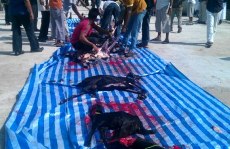This year’s Eid celebrations in the Maldives saw the holiday’s traditional prayers and feasting accompanied by a record number of goats slaughtered in the capital Malé.
The Islamic Foundation of Maldives (IFM) arranged for the importing and slaughter of over 175 goats on Thursday, a record number for a country in which this large-scale practice was uncommon just a few years ago.
Signs appeared around the capital in the days leading up to the holiday advertising the ‘uluhiya’, or slaughter – a word previously unfamiliar in the Dhivehi lexicon – providing a telephone number for anyone who wanted to join in the festivities.
A representative of the IFM explained that the organisation had surpassed its previous efforts this year after its founding in 2009.
“In 2010, we only had 20 goats. In 2011, we slaughtered 80 goats and two cows,” he explained.
“Next Eid we will slaughter a camel – this will be good for the public as it will be the first time this has been done.”
Combined with the activities of other Islamic organisations in the country – most notably the Jamiyyathul Salaf – the number of animals sacrificed came to well over 200.
 Traditional practice dictates that the animals be slaughtered by having their throats cut, before the body is drained of blood. After this, the animal is cut up with some meat divided amongst friends and family and some distributed to the poor and needy.
Traditional practice dictates that the animals be slaughtered by having their throats cut, before the body is drained of blood. After this, the animal is cut up with some meat divided amongst friends and family and some distributed to the poor and needy.
The foundation member explained that, owing to the relative affluence of the Maldives , it was difficult to determine needy individuals and so the meat was distributed to whoever was in attendance.
Local media reported that some meat was being sold for MVR 400 a piece (US$25), but the IFM member said he did not know about this, saying: “Selling [the meat] is not encouraged.”
He explained that, due to the practice being uncommon to the Maldives, Bangladeshis were employed to do the butchery after the animal was killed, although locals were given the opportunity to cut the animal’s throat themselves if they had paid for the animal first.
Goats are often kept in the Maldives’ smaller islands but are an unusual sight in the capital. They are often sacrificed in naming ceremonies.
“People who bought the animals were given the opportunity to slaughter them,” he said, explaining that the animals cost around MVR 3500-4000 (US$227 – US$260) each to purchase in Male, more than double their cost prior to shipping from India.
“When sacrificing, the condition is to kill it at once without damaging or hurting in any other way,” he said, adding that the animals were prevented from seeing the others being slaughtered and that they were adequately fed and watered before the sacrifice.
he said, adding that the animals were prevented from seeing the others being slaughtered and that they were adequately fed and watered before the sacrifice.
“I find it hard to watch,” he added, “but others come and watch it for entertainment.”
The animals were brought into the country three days prior to the sacrifice, being kept near to the petrol shed on the south of the island before being sacrificed on an adjacent plot of land.
The foundation member said that three goats had given birth after being brought to the country, making them unsuitable for sacrifice.
Those animals that were not bought and slaughtered by individuals were sacrificed on behalf of the foundation. The IFM then arranged for a large feast at the nearby Maafanu Madrassa for which 2,000 people were expected. Inclement weather on the day was blamed for the smaller attendance – estimated at around 1,200.
The act of sacrifice and the giving away of the meat – practiced throughout the Muslim world – is intended to symbolise the Prophet Ibrahim’s willingness to sacrifice his only son to show his obedience to Allah.
The IFM was founded with the stated aim of raising Islamic awareness and organising social activities within the Islamic framework in order to “ensure the religious and social development of each and every individual of Maldivian society,” according to its website.
The Maldives has embraced Islam with increasing fervour in recent years. The 2008 constitution saw the practice of Sunni Islam become mandatory for Maldivian citizens as well the establishment of a state ministry to handle Islamic affairs.
Likes (1)Dislikes
(1)Dislikes (0)
(0) 
